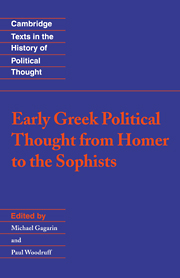Book contents
- Frontmatter
- Contents
- Preface
- Introduction
- Principal dates
- Bibliographical note
- Glossary
- Table of equivalents
- Part I Early poetry
- Part II Tragedy
- Part III History and folklore
- Part IV Philosophy and science
- Part V Sophists
- Protagoras
- Gorgias
- Prodicus
- Hippias
- Antiphon
- Thrasymachus
- Evenus
- Critias
- Lycophron
- Alcidamas
- Anonymus Iamblichi
- Dissoi Logoi
- From unknown authors
- Index
- Cambridge Texts in the History of Political Thought
From unknown authors
Published online by Cambridge University Press: 05 June 2012
- Frontmatter
- Contents
- Preface
- Introduction
- Principal dates
- Bibliographical note
- Glossary
- Table of equivalents
- Part I Early poetry
- Part II Tragedy
- Part III History and folklore
- Part IV Philosophy and science
- Part V Sophists
- Protagoras
- Gorgias
- Prodicus
- Hippias
- Antiphon
- Thrasymachus
- Evenus
- Critias
- Lycophron
- Alcidamas
- Anonymus Iamblichi
- Dissoi Logoi
- From unknown authors
- Index
- Cambridge Texts in the History of Political Thought
Summary
In this section are two passages that cannot be assigned with certainty to any particular historical figure. They reflect teachings that have been associated with various sophists.
The social contract (Plato, Republic 358e3–359b5)
Hoping that Socrates will be able to refute the view, Glaucon tells him what is being said about the nature and origin of justice. We do not know who first proposed the contract theory of the origin of justice, or who first inferred from the theory that justice is not an intrinsic good. Although the language of the passage is Platonic, it probably reflects the views of an earlier thinker connected with some of the sophists.
As far as nature goes, they say that doing injustice is good, while suffering injustice is bad; the badness of suffering injustice, however, outweighs the goodness of doing it to such an extent that after people have been doing injustice to each other and suffering it, once they've had a taste of both, then those who lack the power to avoid the one while choosing the other decide that it is in their interests to make a mutual agreement neither to do nor to suffer injustice. And so (they say) people start making their own laws (nomoi) and agreements (sunthēkai) at that point, and they use the words “lawful” (nomimon) and “just” (dikaion) for what these laws require.
- Type
- Chapter
- Information
- Early Greek Political Thought from Homer to the Sophists , pp. 309 - 312Publisher: Cambridge University PressPrint publication year: 1995



